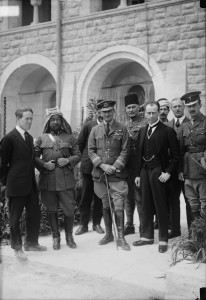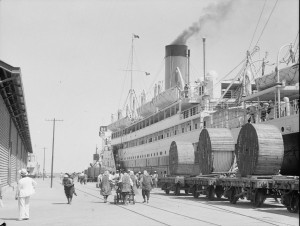
I am inaugurating here a new blog feature where I will periodically highlight something historical that is connected with the day on which I am writing the post. These will be fairly short, and hopefully will open windows onto interesting people and events throughout this land’s history.
Today I will start with the British Mandate era. Following World War I, with the fall of the Ottoman Empire, the British Mandate Period began here, lasting just over a quarter of a century until the establishment of the State of Israel in 1948. The start of the British Mandate was 93 years ago today, on July 1, 1920.
Often, when you hear Jews discussing the British Mandate Era here, they describe it in negative terms. People complain that the British were pro-Arab and anti-Jew. It is for this reason that they nicknamed the Jerusalem location of the High Commissioner’s mansion as the “Hill of Evil Counsel.” The name relates to a site which, according to Christianity, Judas met with the leaders of the Sanhedrin to betray Jesus. But that site was almost certainly not at this spot, as it is too far from Roman-era Jerusalem. Rather, the name stems from the fact that Jews here thought that the end of such a long period of Muslim rule would bring good things for their life. But when they discovered this was not 100% the case, they sarcastically nicknamed it after that event.
That same building, located a short 10-minue walk from my home, also gave its name to the next neighborhood over from me: Armon HaNatziv (Hebrew for “The Governor’s Mansion”). Nowadays, the building is occupied by the United Nations, so many Israelis might think the “Hill of Evil Counsel” name might once again be appropriate.
Regardless, the fact remains that the British were not actually pro-Arab (nor were the pro-Jewish as many local Arabs complain). Like virtually all powers in history, the British were pro-themselves. Some things they did benefit the Arabs more, and other things benefit the Jews more. Most, however, benefit both groups, as the British did a tremendous amount to modernize this land and drag it out of the morass of 400 years of backwards Ottoman rule and into the modern era. Infrastructure, industry, law — all were greatly upgraded by the British in their short time here.
Herbert Samuel, pictured above at his arrival in 1921 at the Cairo Conference where the future of Palestine was first discussed, was the first High Commissioner of British Mandatory Palestine. (And yes, that is Lawrence of Arabia to the left side of the picture.) The official date of the British Mandate begins with Samuel’s arrival in Palestine. But you might come across other dates. For example, the Ottomans surrendered to the Brits here in 1917. The League of Nations officially gave its mandate to Britain in 1922, formalizing the administration legally. But today seems the most logical date to mark the start.

Unfortunately, the thing the British lacked was an exit strategy. It was never made clear how they would know that they had finished preparing the land for self rule. Most probably, this was because they never really wanted to leave. They primarily wanted this land as a means of transferring Middle Eastern regional oil to Europe. Unfortunately for them, their rule was never to be permanent here, and it was this very lack of planning that led to the acrimonious end to their rule here.
But all of this is beyond the scope of this blog post. Perhaps I will touch on some of them in a different “Today in Israeli History” post!
